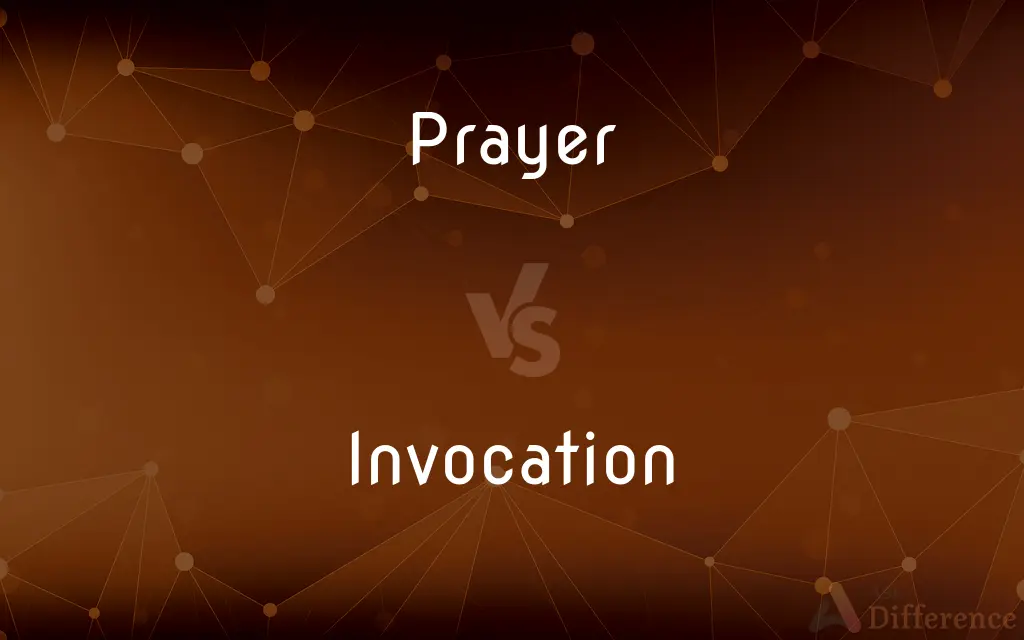Prayer vs. Invocation — What's the Difference?
Edited by Tayyaba Rehman — By Urooj Arif — Updated on March 18, 2024
Prayer is a personal or communal act of communication with a deity, focusing on requests or thanks, while invocation calls upon a deity or spirit for assistance or presence, often at the start of an event.

Difference Between Prayer and Invocation
Table of Contents
ADVERTISEMENT
Key Differences
Prayer often involves a personal or intimate communication with a deity or divine entity, where individuals or groups express gratitude, seek guidance, or request help for personal matters. This act can be silent or spoken and is practiced in various religious traditions. On the other hand, an invocation is a specific form of prayer intended to call upon a deity, spirit, or supernatural force, usually at the beginning of a ceremony or event, to seek protection, guidance, or to invite the entity's presence.
While prayer can be performed at any time and place as a spontaneous or structured act of faith, invocations are typically structured and occur at the beginning of religious or formal ceremonies, including public events, gatherings, or even legislative sessions. Invocations set the tone for the event and are aimed at drawing the attention of a higher power for blessings or guidance, whereas prayers, although they can be for similar purposes, are more versatile in nature and usage.
Prayers can be categorized into different types, such as supplication, thanksgiving, intercession, and confession, reflecting the wide range of human emotions and desires communicated to the divine. Each type serves different purposes, from asking for forgiveness to giving thanks. In contrast, invocations, while they may embody elements of these prayer types, primarily serve to call forth or welcome a divine presence into an event or activity, focusing on the immediate context of the ceremony or activity.
Many religions and spiritual practices include both prayer and invocation as part of their rituals and traditions. However, the intent and context distinguish them; prayers are more about personal communication or communal petition to the divine, encompassing a broader range of intentions, including personal growth, healing, or global peace. Meanwhile, invocations are more focused on a specific occasion, seeking divine intervention or presence for the success or sanctity of that particular event.
Prayers and invocations, while both are forms of communication with the divine, are expressed through different traditions and languages, reflecting the cultural and spiritual diversity of their practitioners. Prayers may be recited in a specific religious language, such as Hebrew, Arabic, or Sanskrit, depending on the tradition, and are often memorized or read from sacred texts. Invocations, though also potentially drawing from sacred texts, are usually crafted to suit the specific occasion, and may incorporate more contemporary language or be delivered in the vernacular.
ADVERTISEMENT
Comparison Chart
Definition
A personal or communal act of communication with a deity, often seeking help or giving thanks.
A call upon a deity or spirit for assistance or presence, typically at the start of an event.
Context
Can be private or public, informal or formal, and is not restricted to the beginning of events.
Primarily occurs at the beginning of ceremonies or public events as a formal act.
Purpose
Varied, including supplication, thanksgiving, intercession, and confession.
To invite a deity's or spirit's presence, guidance, or blessing for a specific occasion.
Types
Supplication, thanksgiving, intercession, confession, etc.
Less varied, usually focused on welcoming or calling for divine presence.
Language and Tradition
Often follows specific religious language and is practiced within various religious traditions.
May use contemporary language or religious language, tailored to suit the occasion.
Compare with Definitions
Prayer
A devout petition to a deity.
She offered a prayer for her family's safety every night.
Invocation
A call to a higher power for inspiration or support.
The artist's invocation to the muses was a plea for creativity.
Prayer
An earnest request or wish.
The lost hiker's prayer was for rescue.
Invocation
A formal request for the guidance of some higher power at the start of an event.
The ceremony began with an invocation for peace.
Prayer
A formula or sequence of words used in or appointed for praying.
The Lord's Prayer is known worldwide.
Invocation
The act of calling upon a deity or spirit for assistance.
The priest performed an invocation for divine protection.
Prayer
The act of asking for a favor from something divine.
Prayer is a common practice across various religions.
Invocation
The act of invoking or calling upon a deity, spirit, etc., as a witness.
The invocation was a solemn start to the proceedings.
Prayer
A spiritual communion with a deity as in supplication, thanksgiving, adoration, or confession.
Morning prayer is a vital part of his daily routine.
Invocation
An appeal to a higher power for assistance in a good cause.
The invocation at the charity event asked for generosity.
Prayer
Prayer is an invocation that seeks with an object of worship through deliberate communication. In the narrow sense, the term refers to an act of supplication or intercession directed towards a god or a deified ancestor.
Invocation
The act or an instance of invoking, especially an appeal to a higher power for assistance.
Prayer
A reverent petition made to God, a god, or another object of worship.
Invocation
An invocation (from the Latin verb invocare "to call on, invoke, to give") may take the form of: Supplication, prayer or spell. A form of possession.
Prayer
The act of making a reverent petition to God, a god, or another object of worship
Belief in the power of prayer.
Invocation
A prayer or other formula used in invoking, as at the opening of a religious service.
Prayer
An act of communion with God, a god, or another object of worship, such as in devotion, confession, praise, or thanksgiving
One evening a week, the family would join together in prayer.
Invocation
The act of conjuring up a spirit by incantation.
Prayer
A specially worded form used to address God, a god, or another object of worship.
Invocation
An incantation used in conjuring.
Prayer
Prayers A religious observance in which praying predominates
Morning prayers.
Invocation
The act or form of calling for the assistance or presence of some superior being, especially prayer offered to a divine being.
Prayer
A fervent request
Her prayer for rain was granted at last.
Invocation
A call or summons, especially a judicial call, demand, or order.
The invocation of papers or evidence into court
Prayer
The thing requested
His safe arrival was their only prayer.
Invocation
(law) An act of invoking or claiming a legal right.
Prayer
The slightest chance or hope
In a storm the mountain climbers won't have a prayer.
Invocation
(programming) The act of invoking, such as a function call.
Prayer
The request for relief by a party initiating a lawsuit, stated in the pleadings.
Invocation
The act or form of calling for the assistance or presence of some superior being; earnest and solemn entreaty; esp., prayer offered to a divine being.
Sweet invocation of a child; most pretty and pathetical!
The whole poem is a prayer to Fortune, and the invocation is divided between the two deities.
Prayer
The portion of the pleadings that contains this request.
Invocation
A call or summons; especially, a judicial call, demand, or order; as, the invocation of papers or evidence into court.
Prayer
(uncountable) A practice of communicating with one's God, or with some spiritual entity.
Through prayer I ask for God's guidance.
In many cultures, prayer involves singing.
Invocation
A prayer asking God's help as part of a religious service
Prayer
(countable) An act of praying.
Invocation
An incantation used in conjuring or summoning a devil
Prayer
The specific words or methods used for praying.
Christians recite the Lord's Prayer.
For Baha'is there's a difference between obligatory and devotional prayer.
Invocation
Calling up a spirit or devil
Prayer
A meeting held for the express purpose of praying.
Grandpa never misses a chance to go to prayer.
Invocation
The act of appealing for help
Prayer
(countable) A request; a petition.
This, your honor, is my prayer; that all here be set free.
Prayer
The remotest hope or chance.
That team doesn't have a prayer of winning the championship.
Prayer
One who prays.
Prayer
One who prays; a supplicant.
Prayer
The act of praying, or of asking a favor; earnest request or entreaty; hence, a petition or memorial addressed to a court or a legislative body.
Prayer
The act of addressing supplication to a divinity, especially to the true God; the offering of adoration, confession, supplication, and thanksgiving to the Supreme Being; as, public prayer; secret prayer.
As he is famed for mildness, peace, and prayer.
Prayer
The act of communicating with a deity (especially as a petition or in adoration or contrition or thanksgiving);
The priest sank to his knees in prayer
Prayer
Reverent petition to a deity
Prayer
Earnest or urgent request;
An entreaty to stop the fighting
An appeal for help
An appeal to the public to keep calm
Prayer
A fixed text used in praying
Prayer
Someone who prays to God
Common Curiosities
How do prayer and invocation differ in context?
While prayer can occur in various contexts, both private and public, invocations are specifically aimed at the beginning of ceremonies or significant events, seeking to draw divine presence or blessing.
How do cultural traditions influence prayers and invocations?
Cultural traditions can significantly influence the language, form, and specific rituals associated with prayers and invocations, reflecting the diverse ways humanity communicates with the divine.
Can invocations include prayers for specific outcomes?
Yes, invocations often include prayers for specific outcomes related to the event, such as peace, wisdom, or success.
Are prayers and invocations specific to certain religions?
Both practices are found across many religions and spiritual traditions, though the form, language, and specific rituals associated with them can vary widely.
Can anyone perform an invocation?
While traditionally invocations may be performed by religious leaders or designated individuals, in many contexts today, anyone feeling comfortable and respectful of the tradition can perform an invocation.
Can invocations be considered a type of prayer?
Yes, invocations can be considered a specialized form of prayer with the specific purpose of calling upon a higher power for presence or assistance at the outset of an event.
Can prayer affect the outcome of events?
Believers in many religions feel that prayer can influence the outcome of events, either through divine intervention or by affecting the praying individual's state of mind.
What is prayer?
Prayer is a personal or communal act of communication with a deity or divine entity, often characterized by requests for help, expressions of gratitude, or seeking guidance.
What is an invocation?
An invocation is a specific form of prayer aimed at calling upon a deity, spirit, or supernatural force for assistance, guidance, or presence, especially at the beginning of a ceremony or event.
Do prayers need to be spoken out loud?
Prayers can be either spoken out loud or offered silently, depending on personal preference and the traditions of the faith being practiced.
How do personal beliefs affect the practice of prayer and invocation?
Individual beliefs and experiences shape how one approaches prayer and invocation, influencing their understanding of its effectiveness, the manner of practice, and the personal significance attributed to these acts.
Is there a specific time or place for prayer?
Prayer can be performed at any time and place, reflecting its personal and adaptable nature.
How are invocations tailored to specific events?
Invocations are often crafted to suit the occasion, acknowledging the specific purpose of the event and seeking divine guidance or blessing for its success.
What are the common elements of prayer across different religions?
Common elements include a sense of reverence, a form of address to a divine entity, petitions or expressions of gratitude, and often a communal aspect.
What is the significance of the language used in prayers and invocations?
The language used can reflect the sacred traditions of a religion, enhance the communal experience, and connect the present with the historical practices of the faith.
Share Your Discovery

Previous Comparison
Subway vs. Railroad
Next Comparison
Zigbee vs. BluetoothAuthor Spotlight
Written by
Urooj ArifUrooj is a skilled content writer at Ask Difference, known for her exceptional ability to simplify complex topics into engaging and informative content. With a passion for research and a flair for clear, concise writing, she consistently delivers articles that resonate with our diverse audience.
Edited by
Tayyaba RehmanTayyaba Rehman is a distinguished writer, currently serving as a primary contributor to askdifference.com. As a researcher in semantics and etymology, Tayyaba's passion for the complexity of languages and their distinctions has found a perfect home on the platform. Tayyaba delves into the intricacies of language, distinguishing between commonly confused words and phrases, thereby providing clarity for readers worldwide.
















































